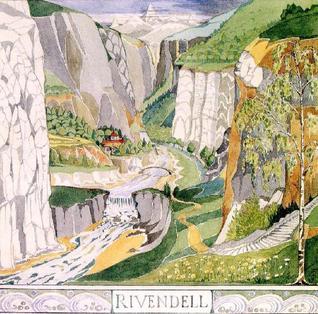
In last week’s Collegian (“Hillsdale Isn’t Athens. This is Sparta.”), junior Nic Rowan compared Hillsdale College to Sparta. According to him, a Hillsdale education more closely resembles the rigorous military training of Spartan youths than the open inquiry that characterized Athens.
But, really, Hillsdale isn’t much like either of those ancient cities. In fact, the place it most resembles is Rivendell, the fictional Elven realm of J.R.R. Tolkien’s “Lord of the Rings” novels.
In “The Hobbit,” Tolkien called Rivendell “the Last Homely House,” and described it as “a perfect house, whether you like food or sleep or story-telling or singing, or just sitting and thinking best, or a pleasant mixture of them all.”
Rivendell is the place Tolkien’s protagonists go to prepare for the quest to save the world from the forces of evil. At Rivendell, the hobbits hear the songs of old and ancient legends — they learn what is good and true and beautiful in the world, and why all those things worth loving are imperiled.
But, they do not learn these things for the mere sake of their defense; indeed, quite the opposite is true. Frodo and Sam and the rest of their party more-or-less overhear many of these old stories and beautiful songs, because the ones singing and chanting them are celebrating their beauty for its own sake.
Likewise, the purpose of liberal education is not merely to teach men what is good, true, and beautiful so those men can become warriors, turning the tide of progressive politics against leftist activism.
In a 1961 essay titled “What is Liberal Education?”, Leo Strauss, a political philosopher who has influenced many at Hillsdale, wrote that “Liberal education is liberation from vulgarity… Liberal education supplies us with experience in things beautiful.”
For Strauss, this liberal education is a preparation for the life of philosophy — the contemplation of those beautiful things. In his view, and the traditional view upon which the heritage of liberal education is built, the goal of the university in society is to make a space safe for this philosophizing.
In a 1962 essay expanding on these themes, Strauss wrote that, “When comparing politics to philosophy strictly understood, one realizes that philosophy is of higher rank than politics.” The object of the good life is the beautiful things, and the good society is organized around those same things, too.
Rowan’s view of Hillsdale College becoming a kind of technical school for budding statesmen, “a conditioning camp that teaches its students how to think, if the students choose to participate,” flies in the face of Strauss’s conception of a liberal education.
To be sure, the college has a certain responsibility to the republic. Students are, in fact, meant to go out into the world and accomplish amazing things, and we should always be grateful for the liberty that makes the city safe for Socrates. But, in a much deeper sense, the republic has a duty to the college. Politics exists to protect philosophy, because philosophy is the higher way of life.
A scholarship of freedom is good and true, and the glories of statesmanship are both necessary and attractive. According to Strauss, though, “liberal education consists in learning to listen to still and small voices and therefore in becoming deaf to loud-speakers. Liberal education seeks light and therefore shuns the limelight.”
Tolkien’s hobbits experience something similar at Rivendell. After an evening of listening to epic poems and great songs, Tolkien wrote that Frodo and Sam “spoke no more of the small news of the Shire far away, nor of the dark shadows and perils that encompassed them, but of the fair things they had seen in the world together, of the Elves, of the stars, of trees, and the gentle fall of the bright year in the woods.”
Commencement is a moment much like this. We gather to remind ourselves what this good life is. We gather to celebrate the essential experience of a liberal education — an experience that transcends politics.
Hillsdale is not the scene of the final battle. We don’t make students endure the core curriculum as a last-ditch attempt to break through the cultural siege of the left; we undertook the endeavor of the last four years because reading Plato’s “Republic” or Dante’s “Divine Comedy” is worth doing for its own sake
Ultimately, our education is founded on something bigger and better than the swirling currents of contemporary politics. “Goodness, truth, and beauty” is more than a marketing slogan — it is a way of life.
Michael Lucchese is a senior majoring in American studies.

